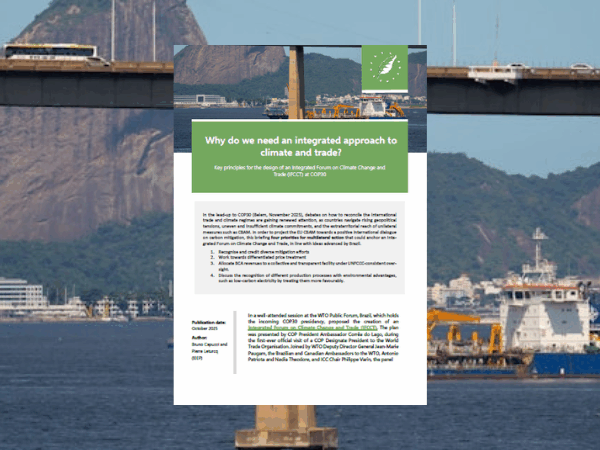AUTHORS: Bruno Capuzzi (independent analyst) and Pierre Leturcq (IEEP)
The EU holds a key position in the climate agenda and should be central to an integrated approach that clarifies the relationship between the climate regime and trade. Because the Paris Agreement is collaborative and largely voluntary, it has limited leverage to ensure enforceability. It opened space for EU measures such as the Carbon Border Adjustment Mechanism (CBAM) to address emissions through trade, creating frictions with the WTO regime. In order to project CBAM towards a positive international dialogue on carbon mitigation, this briefing proposes four priorities for multilateral action that could anchor an Integrated Forum on Climate Change and Trade, in line with ideas advanced by Brazil.
In a well-attended session at the WTO Public Forum, Brazil, which holds the incoming COP30 presidency, proposed the creation of an Integrated Forum on Climate Change and Trade (IFCCT). The plan was presented by COP President Ambassador Corrêa do Lago, during the first-ever official visit of a COP Designate President to the World Trade Organisation. Joined by WTO Deputy Director General Jean‑Marie Paugam, the Brazilian and Canadian Ambassadors to the WTO, Antonio Patriota and Nadia Theodore, and ICC Chair Philippe Varin, the panel signalled both political and business momentum with respect to the role of trade in fostering international climate ambitions and solutions. Details of a formal proposal will be unveiled at COP30, but if taken seriously by the international community, it can lead to a comprehensive climate regime capable of addressing trade-related environmental concerns.
The Brazilian call for action is a response to the way climate and trade have been treated in isolation. The current Paris climate regime seeks constructive solutions based on voluntary emissions reductions, which may lead to uneven climate commitments and regulations among nations. Industries in countries subject to environmental regulations (e.g., mandatory mitigation targets) may face competitiveness shocks when competing with goods produced under less stringent regulations. As companies lose short-term local and international competitiveness due to climate regulations, this adds pressure to the implementation of these measures. Additionally, the WTO trade regime lacks affirmative rules to use trade measures for environmental protection. Today, these measures need to be justified under an exceptions clause. This causes political frictions, legal uncertainty, and adds pressure to the already fragile multilateral trade system. What mix of plausible and actionable solutions could be considered?
In an ideal world, the World Trade Organization should be reformed to establish clear and objective rules for environment-related trade measures; an equally demanding second‑best path would be to embed trade provisions in the Paris Agreement. Both seem to be outside of anyone’s radar. The only option left, being sought by the EU and other actors, is unilateral measures that come with extraterritorial reach. What is therefore necessary is a unified regime that regulates trade—covering areas such as concessions and market access—in alignment with ambitious climate objectives.
The EU holds a key position in the climate agenda and should be central to an integrated approach that clarifies the relationship between the climate regime and trade. Because the Paris Agreement is collaborative and largely voluntary, it has limited leverage to ensure enforceability. It opened space for EU measures such as the Carbon Border Adjustment Mechanism (CBAM) to address emissions through trade, creating frictions with the WTO regime.
In order to project CBAM towards a positive international dialogue on carbon mitigation, we propose four priorities for multilateral action that could anchor an Integrated Forum on Climate Change and Trade, in line with ideas advanced by Brazil.
- A more integrated climate-trade approach should recognise and credit diverse mitigation efforts
- From a development perspective—and consistently with UNFCCC flexibility and leadership—differentiated price treatment is both reasonable and fair
- In an integrated climate–trade regime, eventual revenues from carbon border measures should be allocated to a collective and transparent facility under UNFCCC‑consistent oversight.
- An integrated climate‑trade regime should discuss the recognition of different production processes with environmental advantages, such as low‑carbon electricity by treating them more favourably.

